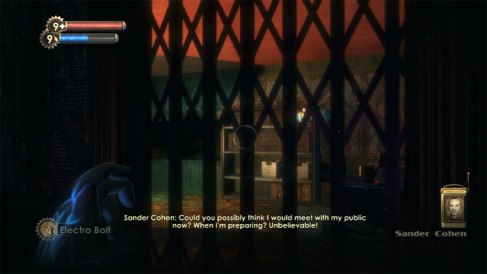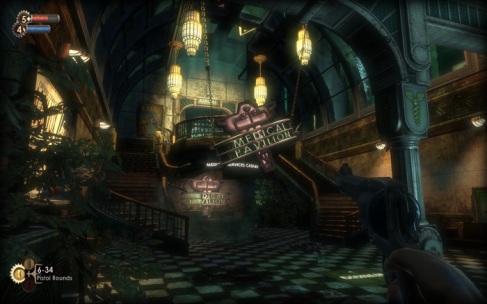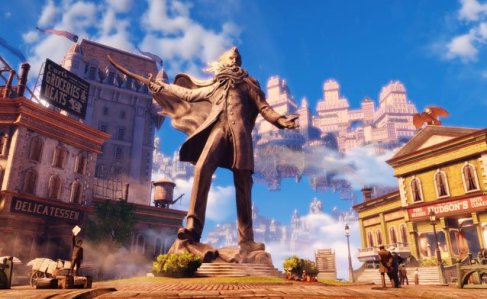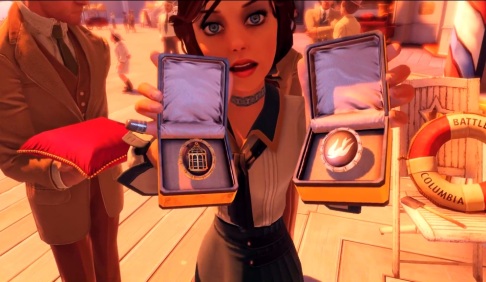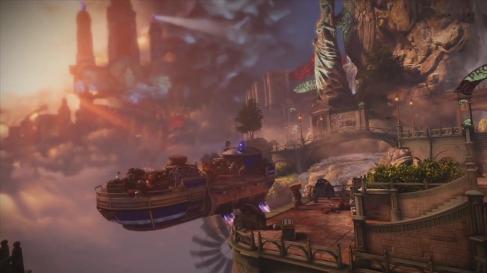Two months ago, Irrational Games released BioShock Infinite, the long-awaited follow-up to the 2007 title BioShock. The sequel shared similarities to the original game: both titles feature fantastic cities in strange places and contain nearly-identical superpower-plus-guns combat capabilities. More importantly, however, is how BioShock Infinite further commented on ideas and themes presented within the original BioShock; themes involving player agency, freedom, and determinism. Interestingly, both games attempt to say something about the nature of video games and the medium itself. In a medium where player choice is tightly controlled by developers, BioShock and BioShock Infinite managed to subvert and comment on these themes, hopefully leaving a lasting impression on players.
When it was released in 2007, BioShock was met with critical and commercial success. The game was a revelation. It hit all the right notes, but most surprising was its narrative and how it used a natural limitation of the video game medium to its advantage: specifically, the lack of player agency naturally inherent in video games. By tying this message directly into its narrative, BioShock managed to comment and critique on how video games are ostensibly static experiences; linear enterprises where “choice” is merely an illusion. Because no matter how much freedom is given to the player, he or she is always on a constrained and tightly-directed path. Any deviation from this path exposes well-worn video games tropes: an overturned chair or waist-high rubble blocks a player’s progress, or locked doors create a dead-end. To the outside observer, these roadblocks are absurd, but to players, these conventions are so common that we don’t even recognize them anymore. The game is directing players away from these locations, and the audience readily accepts that, oftentimes without even realizing that they’re being directed.
If only there were something a superpowered human with a shotgun, rocket launcher, and explosives could do to get through this flimsy gate.
BioShock, however, directly addressed the lack of player agency in its narrative. Halfway through the game, it was revealed that your character, Jack, was subconsciously being controlled through mind control. Through the simple keyphrase “would you kindly,” your character was being directed to unconsciously perform certain tasks. Refusing to do these tasks was impossible, as game progression was dependant on their completion. Basically, unless you had no desire to finish the game, you had no choice but to follow orders, regardless of what the order was. Thus, the game was making an on-the-nose comparison between the player’s character and the player himself. The result was a meta-commentary on the current state of video games, where “control” and “choice” were nothing more than buzzwords; façades which tricked the audience into believing in false substance. A type of digital Potemkin village.
This enslavement to game design was reflected at multiple points throughout BioShock. Perhaps the most memorable example was when the player finally came face-to-face with Andrew Ryan, the antagonist of the game. A brutal and unforgiving ideologue, Ryan directly acknowledges how player choice is actually nonexistent. When he commands Jack using the aforementioned keyphrase “would you kindly,” Jack, as well as the player, is slavishly forced to perform certain actions, ultimately killing Ryan in a brutal fashion. In essence, control is stripped from the player, and the illusion of empowerment disappears. The player himself is violated. In a medium which purports to be a non-passive storytelling experience, BioShock shows the true nature of video games: they are tightly-controlled experiences in which players are slaves to game design. “A man chooses, a slave obeys,” Ryan says, referencing the player’s status as nothing more than thrall, bound to the whims of others. Whereas Jack is a slave to Ryan, the player is a slave to the game designers.
It was a clever perversion of “the man behind the curtain,” but instead of a third-party being exposed as a fraud, the player himself became aware of his or her impotence. It was a brilliant deconstruction of the medium, and its nearly-perfect execution cemented BioShock’s status as masterpiece. It’s no wonder that its follow-up, BioShock Infinite, takes many thematic ideas—and adds a few new ones—from its predecessor. But instead of only critiquing player control in games, Infinite also focuses on the fatalistic nature of games.
Set in 1912, BioShock Infinite puts you in the shoes of Booker DeWitt, a retired Pinkerton agent who has accrued a large debt to the wrong people. In order to repay the debt, DeWitt must travel to the floating city of Columbia and rescue a woman named Elizabeth, the daughter of Zachary Comstock, founder and ruler of Columbia. Much like BioShock’s Andrew Ryan, Comstock is a man dead-set on his ideals. But instead of being an objectivist dictator, Comstock is a religious radical. An ultra-conservative self-proclaimed prophet, Comstock rules Columbia with an iron fist, and his racist and nativist views are infused throughout the entirety of the city. Jingoistic posters litter Columbia’s walls, and the Founders, the ruling class in the city, encourage eugenics and racial purity. All in all, it’s a pretty shitty place for a non-white person.
He may be a megalomaniacal asshole, but Comstock has a magnificent beard
As Booker (and the player) travels through Columbia, he discovers many mysteries, but few are as engaging as the Lutece twins, a brother-sister duo who can bend reality to their will. Throughout Booker’s quest, the twins appear (seemingly out of thin air) and tease Booker with enigmatic riddles, hinting that perception and reality are two separate—yet paradoxically related—aspects of the same coin. It’s all a bit heady, but the Luteces also serve a much more practical purpose: they are Booker’s guides to Elizabeth, the imprisoned daughter of Comstock.
As players progress through Columbia, Infinite’s fatalistic themes become more and more apparent. As a prophet, Comstock claims to have seen visions of the future, visions which come to fruition right before the player’s eyes. Not even NPCs are free from this fatalism. “I have seen their future in the glory,” Comstock tells Booker, explaining why Columbia’s guards are so willing to follow Comstock’s orders, even if it means their death. Comstock’s prophesies and visions create a sense of futility for both Booker and the player, for what free will is there in a world governed by determinism?
Comstock sets his sights on Booker, too. As Booker creates more and more of a disturbance in Columbia, he draws the attention of Comstock himself. “Prophecy is my business, Mr. DeWitt,” Comstock says. “This will end in blood…it always does with you.” In a way, player empowerment has again been taken from the player, but this time in a more metaphorical way. While the player can still control Booker and guide his actions, it all begins to feel hopeless and in vain. In BioShock, the lack of player agency in video games was addressed directly in its narrative. Likewise, Infinite reminds you that you’re on an ultimately linear path with a clear beginning and end. Even if you get to fiddle with the stuff in the middle, you can’t control or change the outcome at all. This is represented in the game’s narrative by Comstock’s visions of the future, visions which are concrete and presumably set in stone.
The deterministic nature of Infinite is again displayed at different points within the game, where you, the player, seemingly have the chance to make meaningful decisions. At one point, Elizabeth asks you to choose between two necklaces: one has the image of a cage, representing captivity and servility; the other, a bird in flight, representing freedom and boundless possibility. Like Pavlov’s dog, gamers have been trained over the years to expect consequences from in-game decisions. Hell, entire genres have been created in which branching story narratives are controlled by player choices. Though obviously smaller in magnitude, the choice between a bird and a cage in Infinite ostensibly exists to provoke a change in story direction; after all, why else would the designers present this dilemma? But throughout the entirety of the game, the payoff for this decision remains elusive. It never comes, making the player’s decision meaningless and continuing the theme of player disempowerment. It is a subversion of a classic video game trope (if the developers take the time and effort to create a unique decision within the game, there will be consequences to said decision) and serves to highlight the theme of futility presented within the game. Players are no more in control of their fate than Booker.
“Choose carefully, Mr. DeWitt. I think this may be a very important decision. Or not. Let’s just get back to killing guys.”
Another example of fatalism and lack of control occurs early in the game, when the Lutece twins first appear to Booker. With coin in hand, the male Letuce is wears a sandwich board divided into two categories: heads and tails. Tick marks show the results of previous coin flips. Apparently the Luteces have asked this question many times before, because there are twelve marks for heads and none for tails. They ask Booker to choose heads or tails, but players have no say in the matter. The choice is automated, and player agency is again removed from the player. Regardless of what the player wishes, the game seizes control and implements its own will onto the in-game universe.
Booker’s choice proves to be inconsequential, however. The coin will always land on heads. Like the bird or cage “choice,” this decision proves to be meaningless. Neither Booker nor the player can change the fate of the coin flip, just like how neither Booker nor the player can change the course of the game. Furthermore, as the male Lutece turns around, players see an additional hundred and ten tick marks in the “heads” category and none in “tails,” calling to mind the fatalism theme found throughout the game. Things that are meant to be will be. It is the first – but not the last – time the game calls attention to the futility of player actions.
One of the most extreme examples of player agency (specifically, the lack of it) occurs near the end of the game, after Booker has finally confronted Comstock. Players walk into a peaceful garden to find a gentle Comstock dabbing at Elizabeth’s wounds with a cloth. Soon, however, Comstock becomes increasingly belligerent to the point of abuse. He grabs Elizabeth’s arm and forcefully yanks her toward him. At this point, players are given the prompt to “intervene.” There are no other options, and the game won’t continue until players accept the prompt and watch Booker’s actions play out. But instead of merely putting a stop to Comstock’s abuse of Elizabeth, the scene ends with Booker repeatedly smashing Comstock’s head onto stone and drowning the man. The escalation is quick, violent, and most importantly, unexpected. Few players could have predicted how their “simple” intervention would have dire, fatal results, but the results serve to remind players of their lack of control in the game.
While I don’t believe this scene to be an intentional subversion of player agency by the developers, it nevertheless fits well within the framework and mold BioShock Infinite takes great care to cultivate for itself. Players have no control over Booker’s actions and are powerless to stop Comstock’s murder. By happenstance, this just so happens to fit within the fatalism and determinism themes presented in Infinite. No matter how many times a player replays that section, the end result is always the same: Booker will always kill Comstock, and players will always be incapable of stopping him. They are powerless to change or affect the outcome at all, much like how Booker is ultimately powerless to change his own fate. Because while he managed to kill Comstock, seemingly undermining Comstock’s prophesies in the process, Booker is still unable to stave off his final fate.
As BioShock Infinite progresses to its conclusion, Booker’s history and his relation to Columbia and Comstock become clear. The aforementioned Lutece twins, the quirky transdimensional-hopping brother/sister duo, were studying quantum mechanics, allowing them to jump at will through the multiverse. Through their journey, they discovered something amazing: there is an Infinite amount of parallel universes, all sharing common threads yet diverging in important ways. In one universe, Booker might turn left instead of right, or he may choose one action over another, like, say, accepting a baptism instead of running away from one.
A baptism isn’t merely a random example, but one integral to the story of the game. Before the events of BioShock Infinite, Booker was a soldier who fought at The Battle of Wounded Knee. After committing war atrocities during the battle, Booker sought salvation through religion. However, he ultimately couldn’t go through with the baptism, and he ended up becoming a drunk, a gambler, and a father to a young girl. An ignominious end for a former hero.
In another universe, however, Booker does accept the baptism, and he begins his life as a new man, with new ideals and a new name: Zachary Hale Comstock. Booker – now Comstock, a religious zealot – builds Columbia and founds the Lutece’s physics research, but too much contact with the machine impairs Comstock’s ability to reproduce. Eager for an heir of his own blood, Comstock uses the Lutece’s transdimensional machine to anonymously coax a reluctant Booker to sell his child, whom Comstock raises as Elizabeth.
It is here where BioShock Infinite’s fatalistic themes are most evident. Booker’s baptism becomes the fulcrum on which the outcome of his life is balanced, and Booker’s life diverges into two possible paths. If Booker accepts the baptism, he is destined to become Comstock, a racist megalomaniac despot. If he doesn’t accept the baptism, Booker becomes an alcoholic who’s willing to sell his own daughter to pay off his debts. Neither are desirable options, but neither are malleable in the slightest. Booker is captive to the demands of his fatalistic universe, much as how players are captive to the natural constraints of the video game medium. The analogous nature between fatalism and the innate linearity of video games is a link that Infinite makes explicit, much as how BioShock drew a comparison between player agency and Jack’s lack of true operative abilities within that game.
Although Booker is not able to change his fate, he is able to avoid it completely by nullifying his entire existence. It’s a strange workaround that gives Booker a modicum of control over his fate. By dying at the baptism, Booker never becomes Comstock and never builds Columbia. Therefore, the events of the game never take place. Booker chooses to preemptively stop these events from happening at the expense of his life. It’s the only control Booker truly has in Infinite’s narrative, and it is mirrored by the player’s own choice to play the game at all. Booker’s reset button stops the game’s events from happening, and like Booker, players are ultimately given the choice of whether the narrative exists when they put Infinite in their console’s disc tray.
At the end of the day, Booker and the player both exhibit the exact same amount of control in BioShock Infinite. No more, no less. The intrinsic connection between player and character is subtly referenced throughout the game, and the mere act of experiencing the game creates an underlying connection between Booker and the player.
In both BioShock and BioShock Infinite, Irrational Games managed to elevate critical discussion about video games. By directly referencing things like player agency, lack of control, and linear paths within their game’s narrative, the studio was able to break the fourth-wall in a very interesting way. It would have been easy to make a straight parody on the ridiculousness of video games, and we’ve seen it before with games like Duke Nukem, Eat Lead, and the much more recent Far Cry 3: Blood Dragon, but Irrational Games chose to go down a much more daring route. The resulting BioShock series is a commentary on the video game medium as a whole: how it’s a tightly-controlled, static art form with only the illusion of control and choice. It is not a damnation of the medium; on the contrary, the BioShock games wouldn’t exist in their current form if it weren’t for these strict, yet natural, limitations of the medium. But it raises questions on alternative ways to play and create games. And as we continue to see many games franchises iterate rather than innovate, it’s interesting to wonder if BioShock and BioShock Infinite’s messages will continue to remain relevant for years to come.

